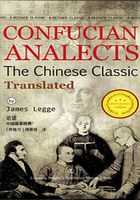
CHAPTER 18
1. Tsze-chang was learning with a view to official emolument.
2. The Master said, "Hear much and put aside the points of which you stand in doubt, while you speak cautiously at the same time of the others:—then you will afford few occasions for blame. See much and put aside the things which seem perilous, while you are cautious at the same time in carrying the others into practice:—then you will have few occasions for repentance. When one gives few occasions for blame in his words, and few occasions for repentance in his conduct, he is in the way to get emolument."
17. THERE SHOULD BE NO PRETENCE IN THE PROFESSION OF KNOWLEDGE, OR THE DENIAL OF IGNORANCE. 由, by surname 仲, and generally known by his designation of Tsze-loo (子路), was one of the most famous disciples of Confucius, and now occupies in the temples the 4th place east in the sage's own hall. He was noted for his courage and forwardness, a man of impulse rather than reflection. Conf. had foretold that he would come to an untimely end, and so it happened. He was killed through his own rashness in a revolution in the state of Wei. The tassel of his cap being cut off when he received his death-wound, he quoted a saying—'The superior man must not die without his cap', tied on the tassel, adjusted the cap, and expired. This action—结缨礼全, is much lauded. Of the six 知, the 1st and 6th are knowledge subjective, the other four are knowledge objective. The first 知之=知之之道. In the other two cases, 之= 'any one thing'. 为=以为, 'to take to be', 'to consider', 'to allow'. 女, thus marked with a tone, is used for 汝, 'you'.
18. THE END IN LEARNING SHOULD BE ONE'S OWN IMPROVEMENT, AND NOT EMOLUMENT. 1. Tsze-chang, named 师, with the double surname颛孙, a native of Ch'in(陈), was not undistinguished in the Confucian school. Tsze-kung praised him as a man of merit without boasting, humble in a high position, and not arrogant to the helpless. From this ch., however, it would appear that inferior mot. did sometimes rule him. 学= 'was learning', i.e., at some particular time. 干=求, 'to seek for'. 2. 阙 is explained in the comm. as in transl.,—姑舍置, but this mean. of it is not found in the Dict. 禄在其中, 'Emolument is herein', i.e. it will come without seeking; the individual is on the way to it. The lesson is that we are to do what is right, and not be anxious about temporal concerns.
